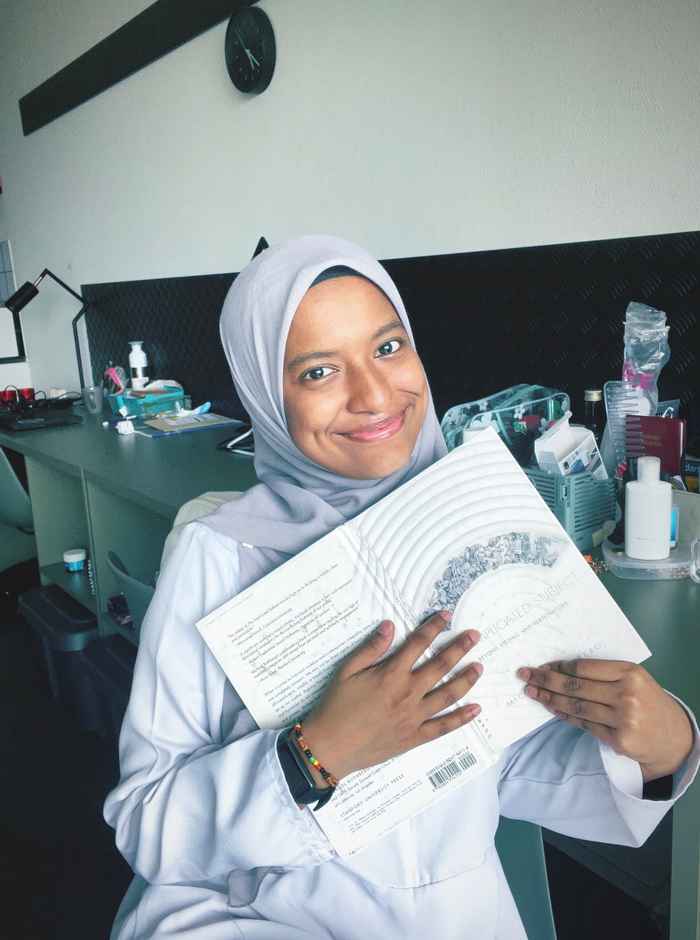'Although literature might be mistakenly thought to include only books and written works, it is actually deeply connected to a wider debate, both locally and globally'

How does English Literature and Culture connect with modern society?
‘Oh, in so many ways! From divided cultural memory, trauma theory, the Anthropocene, neoliberalism, the contemporary, illiberalism, and many more that I can list off the top of my head, I have been exposed to various problems and debates of the present times. Although literature might be mistakenly thought to include only books and written works, it is actually deeply connected to a wider debate, both locally and globally. Literary studies are always interdisciplinary and transdisciplinary, addressing the issues and crises of modern times. I must not forget to mention that this Master's programme does not solely focus on written works, but also encompasses a multitude of different cultural objects such as films, games, and comics.’
What do you like most about English Literature and Culture?
‘Despite the amount of academic growth I have experienced studying here at the University of Amsterdam, the aspect of my Master's programme journey that I cherish the most is the people: both the kind lecturers and my lovely colleagues. I have always been shy to speak up and ask questions in an academic setting due to the fear of knowing less than everyone else. However, the lecturers welcomed my questions with an open heart, listened to my interests, and were happy to guide me. The writing sessions I had with my colleagues helped with the progress of my thesis, as it is always easier to write when you have people keeping you in check. The exchange of ideas between students was also very helpful for brainstorming research topics.’
Studying is hard, and sometimes you need people to make sure you are doing alright. I found those people in English Literature and Culture.
How is the atmosphere at your study?
‘If I had to choose a word to describe the atmosphere, it felt very safe. I remember that when I had a meeting with the programme coordinator a few weeks before the submission of the thesis proposal, I over-prepared myself out of fear that he would question my performance. I did not want to disappoint him and wanted to prove that I was as good as everybody else. However, during the meeting, the programme coordinator asked me if I was doing okay and inquired if there were any ways he could make my Master's degree journey here easier. He probably had no idea how much that meant to me, as I was very far away from my family and friends in my home country and did not have access to my primary support system. Studying is hard, and sometimes you need people to make sure you are doing alright. I found those people in English Literature and Culture.’
Are you a member of a study or student organisation?
‘I am a member of the Islamic student association at the University of Amsterdam, officially called the Muslim University Students of Amsterdam (MUSA). I have found myself feeling much closer to home when surrounded by brothers and sisters who share the same faith. The importance of student organisations is often side-lined, but I have to disagree. International students seek spaces where they can find people they can relate to, and the existence of student organisations definitely helps with that.’
Do you have any tips for new students?
‘New students can constantly be filled with both anxiety and excitement as they approach another stage of life, pursuing a Master's programme. Students should always remind themselves that they are capable and should not be afraid of trying something new. I had a crisis when I was writing an essay due to the absence of familiarity I had with the topic, which made me feel like I was failing. I knew it would have been easier if I had chosen my own topic. I did not trust myself to write about a topic I had just recently learned and wanted to return to my comfort zone of writing about topics I constantly engaged with during my Bachelor's degree. However, I pushed through and told myself that I had learned enough, even if it was only for a short while, to be able to complete the essay. The essay ended up scoring the highest among all my other assignments, and I was utterly shocked. It forms a great reminder to trust yourself more when facing a crisis, to know your worth before giving up, and that you learn the most when you struggle.’